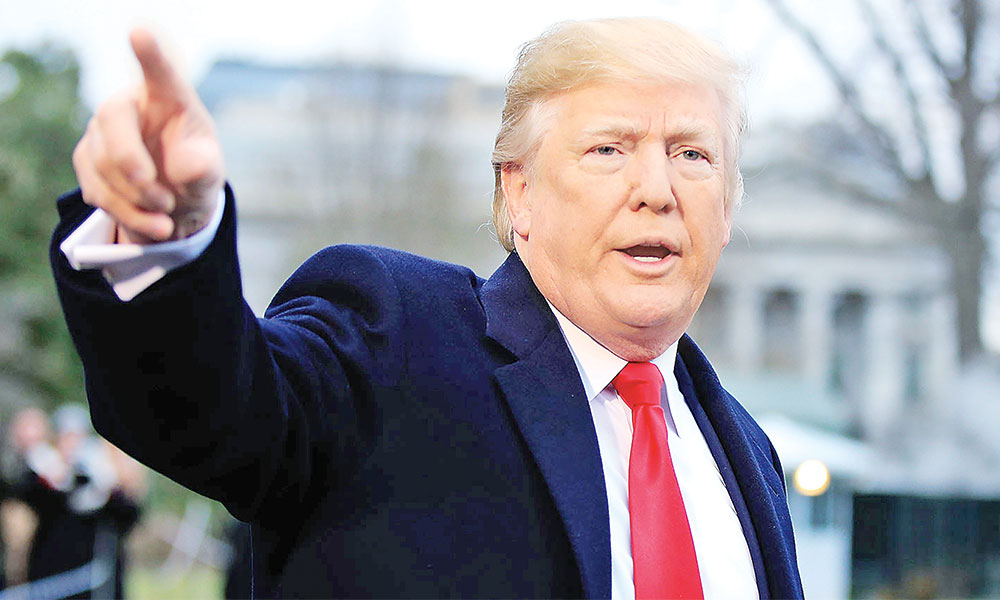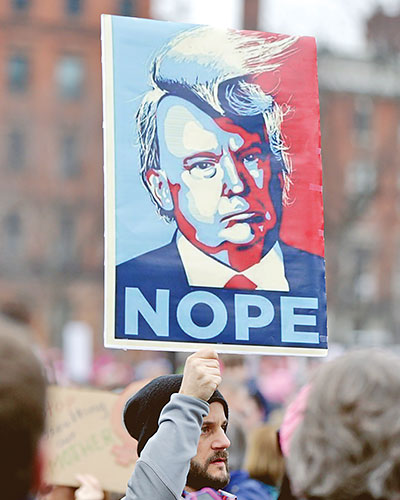MUSLIMS ENTER AMERICAN POLITICS
- 10 Nov - 16 Nov, 2018

Lately I’ve been reading a book that puts the Trump regime and its depredations helpfully in perspective. Frontiers, written by South African journalist Noel Mostert, is a nearly 1300-page history of the Xhosa people of South Africa and their encounter over several centuries with Dutch and British imperialists and settlers. Amidst the grand sweep of all the history it covers, one particular sentence on page 200 jumped out at me: “A [Xhosa] chief who constantly sought to put himself above the traditional laws and customs was abandoned by the people, who then allied themselves with another chief.”
That sounded familiar to me. Meanwhile, I’ve just finished reading a bracingly entertaining – and much shorter – book, Radio Free Vermont by Bill McKibben. McKibben has long been well known as an author and leading activist on environmental issues, but he had never before written a novel, until Donald Trump forced him to imagine the previously unimaginable. Vermont, where McKibben lives, is one of the smallest of the 50 states and has a peculiar history: It was the first state to join after the original 13, and before that it had been briefly an independent republic. It also – like Texas, but with a different history and attitude – claims the right to leave the union if it sees fit.

Combining caper-like elements familiar to fans of John Grisham – complete with plucky youngsters, lawyers, and bumbling feds – with near-future speculation that evokes some of the novels of Kim Stanley Robinson or James Howard Kunstler, Radio Free Vermont is a fable for our times, imagining a “what if” scenario in which some peaceable citizens of tiny, rural Vermont decide that their state’s affiliation with the mighty American empire has passed its best-by date.
“An advantage to writing a fable is that you get to append a moral to the end,” writes McKibben in an Author’s Note. “In this case it’s not ‘we should all secede.’ Instead, it’s that when confronted by small men doing big and stupid things, we need to resist with all the creativity and wit we can muster, and if we can do so without losing the civility that makes life enjoyable, then so much the better. So far, Americans have distinguished themselves in the age of Trump: the first full day of his presidency saw millions of (mostly) women on the street, followed in subsequent days by sights of conscientious Americans flocking to airports to protect immigrants, or thousands of New York bodega [convenience shop] owners shuttering their shops for a day in protest of the new regime’s Muslim ban. This nationwide unity of dissent is just what the situation demands.”
One of the things I want my Pakistani readers to know is that, try as they might, Trump and his enablers and minions don’t set the tone of American society. That’s why the imagination that drives a book like McKibben’s is important. It’s crucial, in times like these, to imagine alternate realities – even implausible ones, and even ones like secession that no one is seriously advocating or undertaking – that complicate and undermine the single story that the authoritarians would impose on all of us. Anyone who lived in Pakistan through the 1980s should readily understand how important that is. The good news is that bullying and pedantic insistence on a single story simply doesn’t work; we all know, from intuition and daily experience, what’s really real.
The wonderful writer Marilynne Robinson – whom I quoted last week – claims startlingly but accurately that “an important aspect of human circumstance is that we can create effective reality simply by consenting to the reality of the phantasms of the moment, or the decade.” What’s happening now is that Americans are no longer consenting to the reality of the phantasms. The status quo, “just the way things are,” is actually the way things are only if everyone agrees – and not everyone agrees anymore. In part, this is because Chief Trump has sought to put himself above our traditional laws and customs. But it’s also because, even pre-Trump, the venerable “norms” of “governance” that we hear so much about these days were already fraying at the seams.
The real current American reality is disturbingly unsettled and untenable. That’s frightening and confusing. But the flip side is that it frees us from having to continue making excuses for the status quo – simply because there no longer exists a status quo for which to make excuses.
In A Paradise Built in Hell: The Extraordinary Communities That Arise in Disaster (2010), the writer Rebecca Solnit shows how ordinary people on one hand, and established authorities on the other, have responded to natural and other disasters, from the 1906 earthquake in San Francisco to Hurricane Katrina in New Orleans in 2005. There are exceptions in both categories, but generally speaking Solnit shows that those in power respond to disasters by circling the wagons to protect their own interests both institutional and personal and by sending in the troops, not to rescue victims but to control and even criminalise them, whereas ordinary people often quite spontaneously rescue and comfort each other and assemble themselves into communities of mutual aid and support.
After the San Francisco earthquake, for example, ordinary people organised and ran ad hoc soup kitchens, while the mayor and his cronies busied themselves scheming to relocate the city’s famous Chinatown from the prime real estate it occupied to the far southern edge of the city. The overall impression Solnit leaves us with is an optimistic one: that “just the way things are” is not really the way things are – that human beings are actually a much better species than we tend to give ourselves and each other credit for, if ever we’re left to behave freely without coercion.
The Trump regime is the political equivalent of a natural disaster inflicted on my country and the world. The task at hand for us ordinary people is to rescue and comfort each other, and to assemble ourselves into communities of mutual aid and support. •
COMMENTS